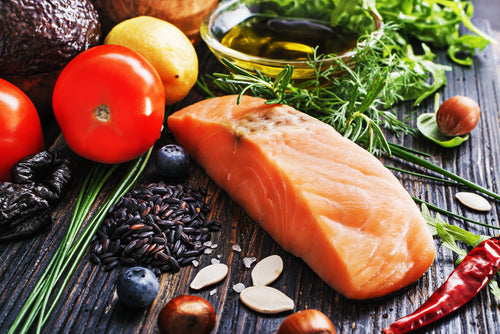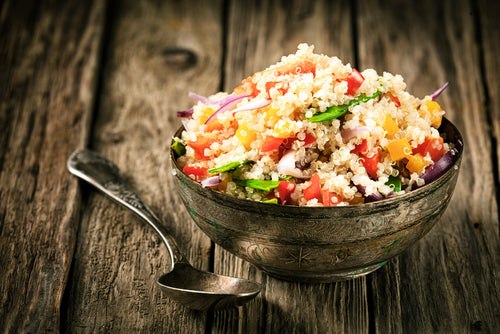If you’ve made your way through countless acne treatments and nothing seems to work, taking a closer look at your diet could help. The scientific community has known for decades that there is a link between acne and diet.
Wading through the countless fad diets and overhyped acne diet plans is a chore, so we’ve gone ahead and done the heavy lifting for you. Here are three things you should know before trying an acne diet:
- There is some evidence that a low glycemic diet and a Mediterranean diet can help reduce acne.
- Acne diet plans which reduce inflammation have shown promise to reduce the severity of acne.
- No diet is suitable for every acne sufferer. Be sure to experiment to find what works for you and your skin.
Low Glycemic Food Diet
Spikes in insulin have been linked to acne breakouts. Therefore, it makes perfect sense that eating low glycemic foods (i.e., foods that have little impact on blood sugar levels) can help reduce acne.
Multiple studies have confirmed that low glycemic diets can benefit acne sufferers. In one study, 43 male acne patients were separated into two groups. One group went on a low glycemic diet for 12 weeks, while the other ate carbohydrates without paying attention to the glycemic rating.
After 12 weeks, the group which went on the lower glycemic diet had a greater reduction in acne than the control group, as well as an improvement in insulin sensitivity.

Mediterranean Diet
This famous diet is inspired by the cooking style of people living near the Mediterranean Sea. Rich in fruits, vegetables, fish, nuts and whole grains, the Mediterranean diet has been celebrated for its heart-healthy focus.
With its abundance of powerful antioxidants and omega-3s, the Mediterranean diet can also potentially clear up your skin. Fish is eaten regularly in the Mediterranean and is rich in omega-3 fatty acids. Research suggests that diets rich in omega-3 fatty acids can help those with moderate to severe acne.
However, this diet also includes the occasional glass of red wine. Alcohol can cause hormonal disturbances, which can subsequently cause breakouts. You may want to consider excluding alcohol if you go on the Mediterranean diet.
Gluten-Free Diet
Everyone seems to be going gluten-free these days, but can it really help clear up your skin? According to scientific evidence, avoiding gluten probably won’t do anything for you unless you have celiac disease or a gluten sensitivity.
There is zero evidence to suggest that gluten causes acne in people without celiac disease or non-celiac gluten sensitivity. However, skin problems have been well studied in those who do have a gluten intolerance.
If you suspect that you are gluten-sensitive, it doesn’t hurt to go off gluten for a while and see if it helps your skin. However, be sure to only exclude gluten so that you can be certain that it’s the cause of your acne issues.

The Vegan Diet
Can a plant-based diet be the solution to your acne woes? Although it might not eliminate your acne entirely, being a vegan may help alleviate acne symptoms.
A proper vegan diet is rich in healthy fruits and vegetables which are loaded with vitamins and minerals that are beneficial for the skin. For example, leafy green vegetables and nuts are rich in vitamin E, which can protect skin cells from harmful free radicals and speed up the healing process.
The only possible issue with the vegan diet is the potential to miss important nutrients that would normally come from animal sources. Those who don’t do the proper research can make their acne worse by failing to get adequate amounts of zinc, which plays a significant role in reducing acne.
Take the skin care quizGrain-Free Diet
Going grain-free can clear up your acne simply because you’re avoiding all grains—including refined grains which have been shown to worsen acne.
However, eating whole grains can benefit your skin. Whole grains have a low glycemic index, which means that they won’t spike your blood sugar levels.
They’re also high in zinc, which as we mentioned earlier can decrease acne symptoms by reducing inflammation.
We can’t get behind every grain-free diet for acne because they can vary greatly. For example, the Paleo diet and the Ketogenic diet both exclude grains, but they are two different diets.
You Are What You Eat
While we still don’t know the exact cause of acne, we do know that the foods we eat can impact our skin. Before going on a specific acne diet, be sure to do your research and check the science supporting it.
Keep in mind that a diet shouldn’t replace your regular skin care regimen. Using men’s skin care products to clean and hydrate your skin is key to eliminating your acne for good.








